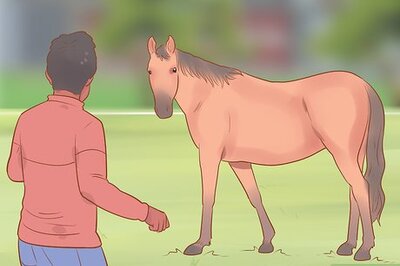
views
Lubbock: Eccentric Texas businessman-turned-artist Stanley Marsh 3, whose partially buried row of Cadillacs became a road-side tourist attraction in the 1970s, died Tuesday. He was 76.
Marsh, long known in his hometown of Amarillo as a prankster and philanthropist but who faced indictment alleging he molested teenage boys late in life, died in Amarillo, criminal attorney Paul Nugent said.
An heir to his family's oil-and-gas fortune, Marsh was a quirky but successful banker and television executive. But he was best known for his art, most notably "Cadillac Ranch," a row of 10 graffiti-splattered cars seemingly standing on their noses along Interstate 40 west of Amarillo.
The display, which will celebrate its 40th anniversary Saturday, quickly became a tourist attraction after Marsh commissioned the Ant Farm, a radical art and design collective, to build it in 1974. The cars - acquired from junkyards, private owners and used car lots - were moved a mile west in 1997.
In 2012, when Marsh was 74, several lawsuits were filed alleging he'd paid two boys, ages 15 and 16 at the time, for sexual acts. He settled the lawsuits the next year, but was indicted two months later on charges that accused him of sexually assaulting six teenagers in recent years. Marsh denied the allegations and vowed to fight them in court. No trial date had been set.
"It is unfortunate Stanley died before he had the opportunity to clear his good name," Nugent said in an emailed statement. "The criminal accusations made by those seeking to become millionaires will now forever remain mere allegations - untested and unproven in a criminal courtroom."
Marsh's artistic creations include a mesa painted to look as if it were floating and a football field-sized pool table hidden in the Panhandle terrain that only could be seen from the air. Hundreds of his mock road signs popped up in Amarillo neighborhoods, bearing such slogans as "Big Deal" and "My Grandmother Can Whip Your Grandmother."
"Amarillo has lost a bit of its color," longtime friend Wyatt McSpadden said. "He certainly enlivened what might have been a kind of dull place."
Marsh, whose health had deteriorated in recent years after a series of strokes, had long been pulling pranks in Amarillo.
"By nature I'm an introvert, and I'm a shy person," Marsh once said. "When I do these stunts, which cause a great deal of attention, I can kind of shift gears and act like a master of ceremonies."
Marsh was born on Jan. 31, 1938, in Amarillo. His father and grandfather made their fortunes in the oil and gas business, but Marsh didn't follow in their footsteps. His given name was Stanley Marsh "III," but he changed it to "3" because he thought the former was pretentious.
His creative bent began as a child and included carving swords and painting with watercolors, prompting some to tell him that made him an artist.
"It's a lot better to be an artist than to be just somebody who makes things, so I said, `Of course I'm an artist,'" he told The Associated Press in 2009.
He earned his bachelor's degree in economics and master's degree in American civilization from the University of Pennsylvania. He and his wife, Wendy, adopted five children and had numerous grandchildren, and lived in Toad Hall, a 300-acre estate on the outskirts of Amarillo.
He returned to Amarillo after college in the late 1960s and impressed those who knew him as a prankster with his business skills by heading a local bank. In 1967, Marsh purchased KVII-TV and turned it into the city's top-rated television station within a few years.
Marsh sold the station in 2002 but continued to go to his office and pursue artistic endeavors.
In 1975, Marsh showed up at the Washington bribery trial of then-U.S. Treasury Secretary John Connally, a Texan accused in a milk-price scandal, dressed in a fringe Western jacket and carrying a pail of cow dung.
Despite such antics, Marsh said he considered himself mature and responsible, a "leader of men who is doing what I want to do, and more people should be like me."
But some felt he went too far.
In 1994, Marsh was accused of locking a local teenager in a chicken coop and threatening him with a hammer for stealing one of the hundreds of diamond-shaped street signs he'd placed around town, some of which read: "Steal This Sign." Marsh later pleaded no contest to two misdemeanors.
Although his art and shenanigans were often public, Marsh said he never wanted to be figured out. In 1994, he said he wanted his epitaph to read in part: "Thanks, everybody. I had a good time."



















Comments
0 comment